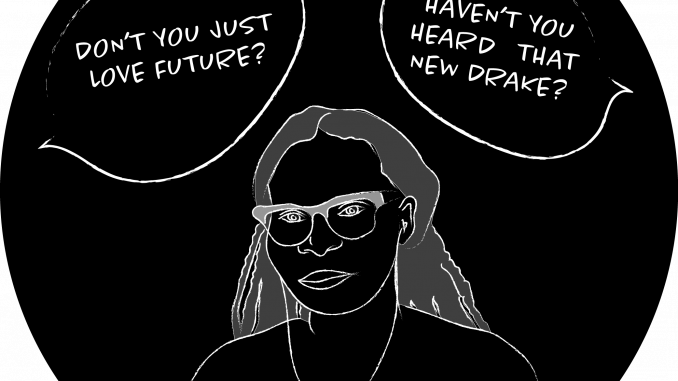
Don’t you just love Future, he always gets me so pumped to go out!”
“Oh my God, you haven’t heard that new Drake yet? I definitely thought you would’ve.”
I have always struggled with being a person of color and sharing my musical preferences, because most people assume I exclusively listen to rap, or more recently, trap music — a subgenre of rap that focuses on life in the streets.
I do like trap music, but I also like a plethora of other music like French pop from the 1960s, deep house beats, alternative rock and U.K. Grime.
Because of this, my musical taste has always been labeled by others — even my parents — as “different,” or more often, as “weird.”
Music has always been a reflection of my identity at a specific moment in time. As I have evolved as a person, so has my music preferences.
For this reason, when someone stereotypes or criticizes my music taste, I feel like I’m doing something wrong. I feel like I’m not “Black enough,” like I’m not accepted within my own community.
In the past, I would try to remedy this feeling by only listening to hip-hop.
Hip-hop and rap are often seen as quintessential to the Black experience. It’s music created by Black artists as a solution to feeling voiceless or ignored. It usually focuses on a rags-to-riches storyline, and it often discusses issues some Black people face, like police brutality, poverty and violence.
While hip-hop is vital to the Black community, many people tend to forget that it is not the only genre to which Black people have made substantial contributions.
People criticize me for liking electronic house music — characterized by rhythmic beats with a futuristic sound. When I tell them I like the artists Toro y Moi, Mura Masa or even Kaytranada, they tell me I like “white people music.” But it is obvious to me that they are not as well-versed in music history as they seem to think.
I learned in my Mass Media in the Black Community class that house music developed in the 1980s in Chicago. Black DJs mixed hip-hop beats with drums and synthesizers to create a unique sound as a solution to disco’s declining popularity. Meanwhile in Detroit, Black DJs who were fond of the Chicago house music scene expanded upon the house genre by adding more of an electronic futuristic sound. Thus, techno was born.
Since then, there have been many subgenres, like trance, electro house and chillwave, which all stemmed from the creation of house and techno music by Black artists in the 1980s.
I understand hip-hop made it OK for Black people to express themselves in a way that was different from the mainstream. And while I love both hip-hop and rap, I do not believe that I or other Black people should be typecast into liking only this genre.
Constantly being judged on my music taste is both draining and insulting.
After years of trying to fit into the musical standard that others placed on me, I have decided to continue listening to music of my choice without feeling shame.
All people should be able to see the beauty in something as universal as music, no matter the genre.
Cierra Williams can be reached at cierra.williams@temple.edu.


Be the first to comment